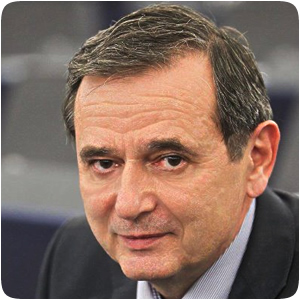 Green Deal puts the field
of transport under great
pressure. Of course, this
does not surprise anyone
in this field, as transport has a fairly
large contribution to CO2 emissions.
Green Deal puts the field
of transport under great
pressure. Of course, this
does not surprise anyone
in this field, as transport has a fairly
large contribution to CO2 emissions.
The EU's ambition to become the
first carbon-neutral continent is to be
praised, as it would mean no other
thing than a continent whose citizens
breathe the cleanest air on the
planet, with positive consequences
for their health and life expectancy.
However, at the same time, we
must be careful that the measures
implementing the Green Deal do not
jeopardise mobility and connectivity
in Europe. Ideas such as the one
that I have heard, proposing that on
less that 500 km distance not air
transport should be available, but
only road and rail, are, from my point
of view, a trap. Short distances are
actually, in my opinion, the perfect
opportunity to use electric planes,
which could be extremely useful
between regional airports.
That is why, during the recent
meetings I had with transport officials
in the European Commission, I
emphasised that the regulations
proposed by the Commission must
relate to the environment, but also
to transport so that competence can
be shared in Parliament between
the Environment Committee (ENVI)
and the TRAN Committee. While
ENVI focuses on environmental
issues, TRAN takes into account the
consequences of environmental
measures on industry.
2021 means for the EP many of
debates and votes on regulations
related to fuels, the revision of
transport networks, the new emission
levels generated by cars, the trade
in certificates in aviation and
maritime transport etc. On those very
important files TRAN must be able to
have a big say.
On the other hand, there is a tendency
of putting the aviation into a shadow
corner, due to the level of emissions
compared to the railway, for instance.
We should not allow this. We need
to make all modes of transport
more environmentally friendly in a
sustainable way. The sustainability of
the European aviation industry can
contribute to the post-pandemic
economic recovery of the European
Union. The field of aviation is under
immense pressure, at a time when
the health crisis, the achievement
of environmental and digitalization
objectives, and a fierce international
competition are overlapping.
We already have strong competition,
especially with airlines from the Arab
countries. Certainly, this competition
will increase for European companies
as a result of the requirements of
the Green Deal, digitalisation and the
effects of the crisis caused by the
Covid pandemic.
As sustainability is the key word, we
need research and a proper budget
for the Clean Sky 2 Joint Undertaking,
which aims to find technologies that
reduce emissions generated by the
aviation sector.
In order to maintain the
competitiveness of the European
aviation industry, each proposed
measure to achieve environmental
goals and the objectives of
digitization must be taken on the
basis of impact assesments. And
these impact assesments must
pursue both environmental and
digitalisation goals, as well as
maintaining competitiveness and
jobs alike.
Clearly, in order to maintain the
competitiveness of the European
aviation industry, the Union must
act simultaneously in two directions:
internally, it is about increasing
funding for research and innovation
– new technologies are essential in
the transition to zero emissions and
digitalisation – and globally, where
the Union needs to have
a stronger voice in promoting
CORSIA (Carbon Aviation
Compensation and Reduction
Scheme) and introducing common
rules for competitiveness.
But in order to be successful, the EU
and the Member States must speak
and act with one voice. Unfortunately,
there is a tendency to support
national interests to the detriment
of the European one. The experience
I have had during the SES2 +
negotiations and the result, embodied
in the text of the regulation adopted
by the Council, is the best example
of this trend. Council voted a SES2
minus instead of SES2 plus !
During the negotiations in the
Parliament, many of the tabled
amendments related to air traffic
management, were in the sense of
returning to national approaches,
which is, in my opinion, a regress.
These nationalist positions have
nothing to do with nationalism in
the classical sense, but only with the
preservation of privileges and money
at the national level and the increase
of these sums as much as possible.
But let’s not forget that the money
comes from the passengers, from the
citizens. Do we offer them something
better if we increase the prices? Will
they be able to withstand these price
increases?
I would conclude by once again
supporting the idea of declaring 2022
as the European Year of Aviation.
The Sky and Space Intergroup,
whose chair I have the honour of
being, has already sent a proposal
to the European Commission, and I
hope that the proposal also has the
support of the Commissioner for
Transport, Ms Adina Vălean.
EU has to clearly state that European
economies cannot survive without
aviation, and citizens need to become
aware of how important this sector
for each of us is.